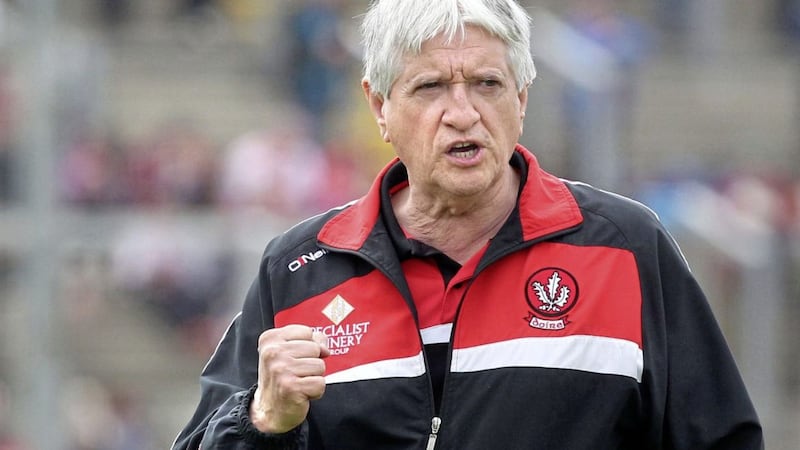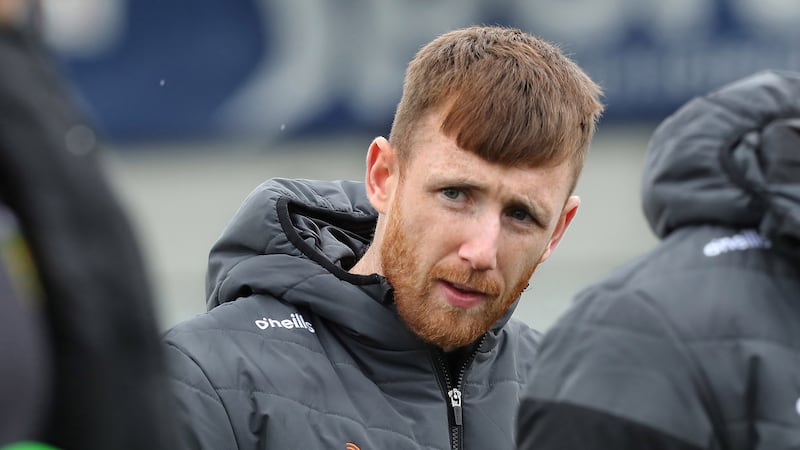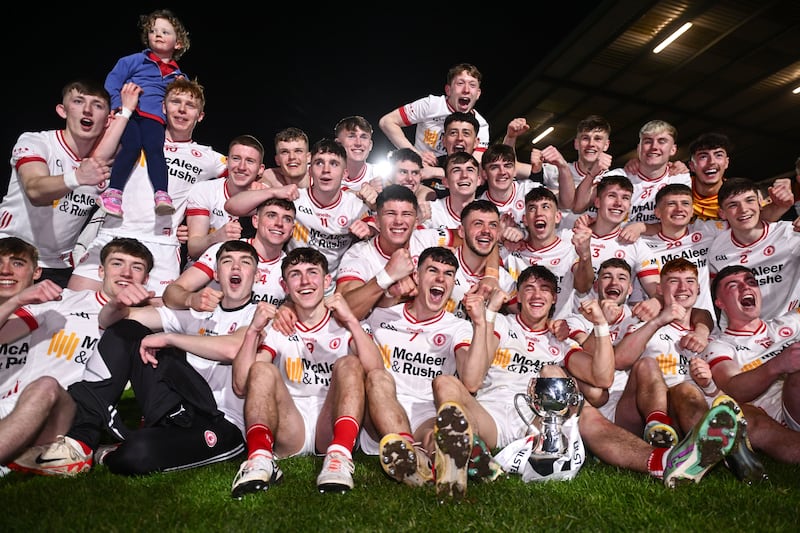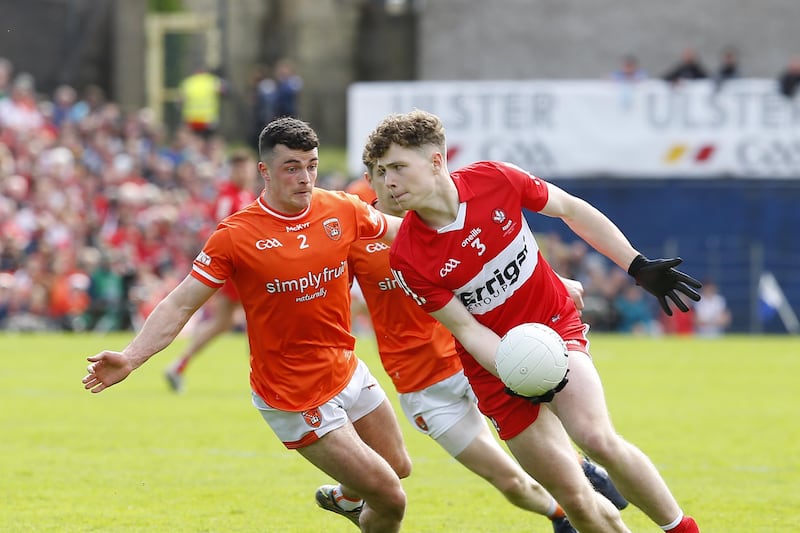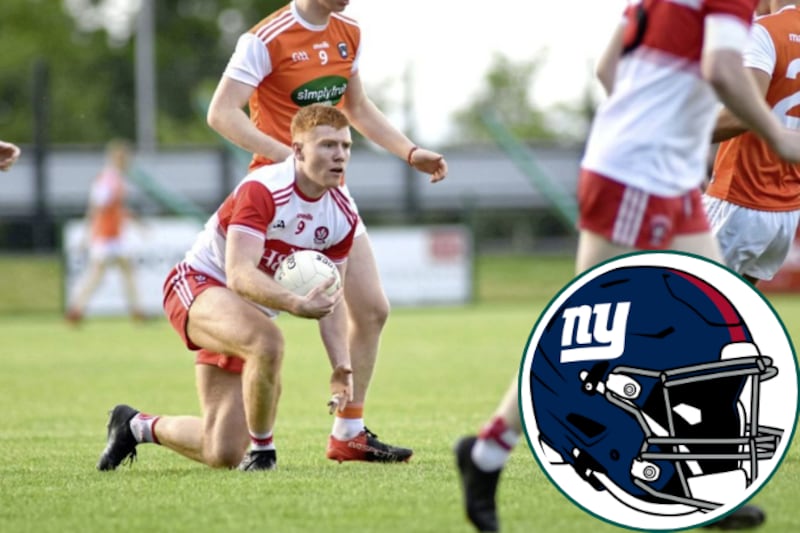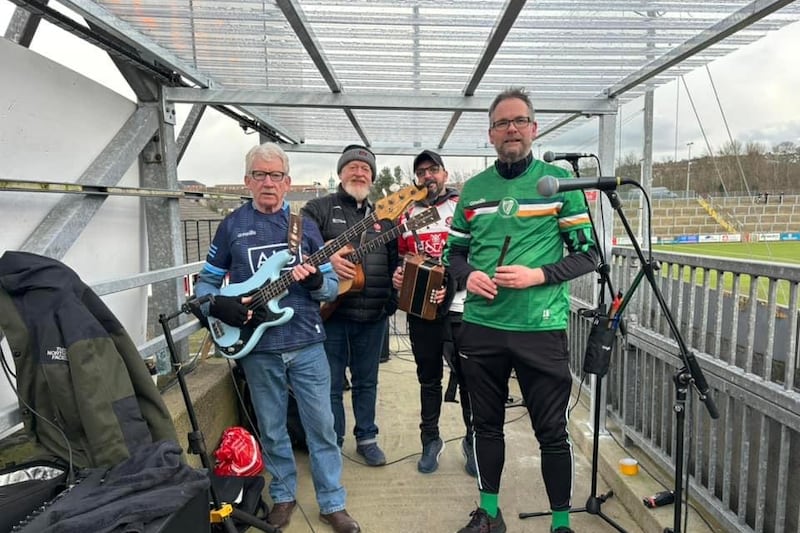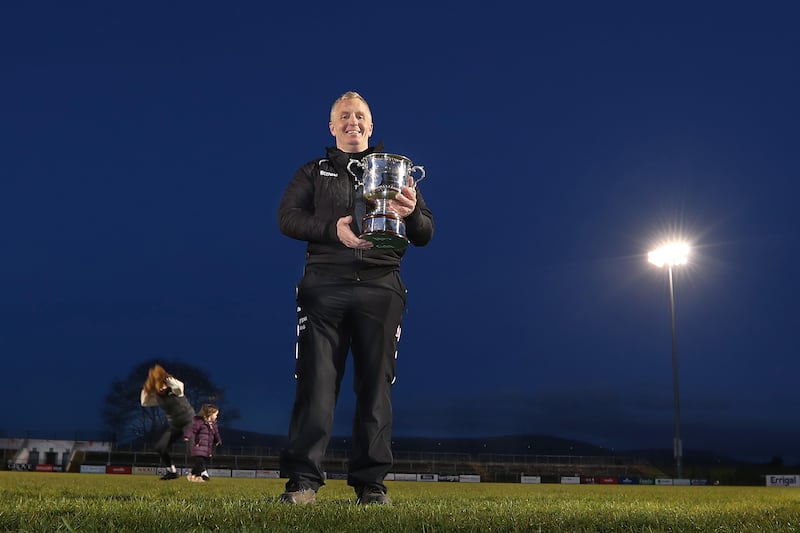IN late 1940, diggers rolled in and cleared the green grass of Tyrone for the concrete and tarmac of the bomber base at Kinrush.
Farmhouses and haysheds made way for barracks and aircraft hangars and families who had farmed the land for generations were cleared out for the construction of the three runways that allowed US Airforce Flying Fortresses from the parish of Ardboe to blast German cities to rubble during World War Two.
The McIver clan were among those forced to sell up. Barney McIver started over a few miles away near the village of Derrychrin, in the Tyrone part of the parish of Ballinderry. In the 1960s he was offered the chance to buy back his land and he did but Derrychrin was home by then and the world had settled down.
Barney McIver was a man who started at the back of The Irish News and worked his way to the front. He loved sport and his children inherited his passion for it but football allegiances are complicated in Ballinderry. His son Brian lined out for the Shamrocks club that straddles the county line between Derry and Tyrone but then returned to his family’s Ardboe roots.
One of his team-mates at the O’Donovan Rossa club was the legendary Frank McGuigan.
“I would have been wearing the number nine jersey beside Frank in midfield but Frank did all the playing. He was class, he absolutely oozed class,” says Brian with a smile.
“He went to the Rainey in Magherafelt and I have no hesitation in saying that if he had stayed at rugby he would have played out-half for Ireland. No doubt. He was a brilliant player, he was a brilliant athlete.
“He left school after O-Levels and went to work as a plasterer. He was as skilful a player as every played Gaelic Football but the plastering left his upper body seriously strong. When he went up in the middle of the field to catch a ball he just cleared an area to his left and right with his sheer physical strength and then plucked her out of the air and came down and sold his famous dummy and away he went. Great skill, good athlete and very down to earth fella. It was great playing with him because he did all the playing.”
McGuigan of course went on to star for Tyrone at senior level and even has an Ulster final named after him – 1984s ‘McGuigan final’ in which he scored 11 points. By that stage Brian had already hung up his boots. He career was ended prematurely by a back injury at just 23.
“It recovered but not to the stage where I felt comfortable playing,” he explains.
“And I would still get a bit of pain. When I get out of the car it still takes me five minutes to loosen up.”
One door shut but another opened. He became involved in coaching at St Pius X College in Magherafelt where he taught history for three decades and soaked up all he could learn from the likes of the late Brendan Convery. From there he progressed into club management and helped guide Ardboe to the Tyrone championship in 1984. At the same time, his sons Michael and Paul were coming through the junior ranks at Ballinderry so Brian kept a foot in both camps.
In 1995, he took Ballinderry to the championship in Derry (the club’s first in 15 years) and simultaneously guided the Ardboe U16s to the Tyrone final.
As bad luck would have it, Ballinderry drew Errigal Ciaran in the first round of the Ulster club on the day of Ardboe’s final and Brian’s attempts to alter the fixture schedule fell on deaf ears.
Ballinderry won, Ardboe lost.
“I was always annoyed that it wasn’t changed,” he says.
“I might not have made the slightest difference if I had gone but I’d have liked to have been there.”
Ballinderry got past Errigal but lost to Cavan’s Bailieborough in the Ulster Club Championship that year. The following season, Bellaghy regain the Derry crown and remained top dogs, pipping Ballinderry in the finals of 1999 and 2000.
Brian was approached to return to the club for the 2001 season.
He recalls: “I was coming out of a wake one evening and a Moortown man said to me: “Brian, you’re back… You have unfinished business.”
“I says: ‘What do you mean by that?’
“He says: ‘You should have won an Ulster title with them the first time. Yiz can do it now’.”
And they did. By the end of that year Ballinderry were Ulster champions and the following year they won the All-Ireland. Determination, team spirit, fitness, ability, physicality… the Shamrocks had all those bases covered and they had a little luck to go along with them.
“In the first round of the Derry championship that year we played Craigbane and Derry had played the previous Sunday in the Championship,” Brian recalls.
“Four or five of the Ballinderry lads had played and we went out on the Wednesday night and got over Craigbane by the skin of our teeth.
“Conleith Gilligan sent in a free-kick that went through the ’keeper’s hands or somebody got a touch on it and it ended up in the back of the net. That won the match for us but we could have gone out that night.”
On and on they went. Bellaghy were dethroned in the final by a single point and Adrian McGuckin junior raised the John McLaughlin Cup.
“In the first round of Ulster we were down four or five points ’til St Gall’s at Casement and then came back and got a draw and won the replay in Glen,” says Brian.
“I still reckon that was the tensest game that I have ever been involved in. Oooooh, it was nip and tuck and Ballinderry got over the line by a couple of points. That was a good St Gall’s side as they later proved when they went on and won the All-Ireland. Once we got over that we never really looked back.
“We beat Cavan Gaels in the semi-final and then Mayobridge in the final in one of the best club games I ever witnessed. It was a beautiful November day, it was the type of day you shouldn’t be getting in November and both teams played fabulous football. Ballinderry got over the line and we beat Tir Chonaill Gaels in London and then Rathnew at Pearse Park in Longford.
“It was a desperate day. Ballinderry won it but the game never should have been played. You would have thought Conlieth was walking on water that day… He just glided over the surface and that was as good an individual performance as I’ve ever seen. The team played well and then we had Nemo Rangers in the final in Thurles.
“Nemo were a super side, they would have went in as favourites but Ballinderry got the wee breaks at the right time. Declan Bateson got a goal early on and we started the second half like a house on fire – big Barney McCusker kicked one over from about 60 yards.
“Then Nemo started to come back and back but Ballinderry turned them over. We had Dessie Ryan in during the season and he did a lot of individual coaching with the lads. He did a lot of work on the forwards’ tackling. Declan Bateson knocked the ball away from one of their defenders and toe-poked it to Adrian McGuckin. He drew their ’keeper and fed Gerard Cassidy… Back of the net and that gave us the breathing space. It was a great team performance.
“The final was in Thurles so you’re never going to travel home that night. We had a function in Hayes’s Hotel, where the GAA had been established. Very historic building and Thurles is the home of the GAA in many ways so it was very appropriate to be there.
“We had a very good night and by the time we got gathered up the next day it was half-five or six o’clock before we got back to Ballinderry. The reception was unreal. A lot of the lads had enjoyed the night before but we said to them: ‘Look, we’re not going to have a lot of drink on the bus going home because this is going to be worth remembering’. And so it was.”
Throughout seasons in club management from Ballinderry to Dromintee (he came close to breaking Crossmaglen’s stranglehold in the Orchard county) and with Donegal, Down and Derry, he has constantly been learning. He learned a precept in his early days with Ardboe that he has always tried to stick to: Pick who’s doing best in training.
“It doesn’t matter what his reputation is, you pick who’s doing the business and that’s a lesson I learned many, many years ago with Ardboe,” he explains.
“Ardboe had a championship match and there was a lad playing corner-back who had been exceptional all year. He had been sick all week but I thought he’d be alright on the day. It was only after the game that I realised he had taken an absolute toasting but I was still waiting on him to play the way I thought he could play but he wasn’t right, I never should have played him.
“I took a sheet of paper that night and wrote: ‘On any given day, any player can be taken off’ and I pinned it up in my study. Throughout all my time in management that stayed on the wall and I stuck to that. It doesn’t matter who he is, if he ain’t doing it, he can be taken off.
“Derry won the Division Two final in Croke Park and I took ‘Skinner’ (Eoin Bradley) off and I got heavily criticised: ‘You never take off your best player’. Skinner wasn’t doing it that day and I couldn’t look at him any longer. On went Emmett McGuckin and five minutes’ later he stuck the ball in the back of the net. On any given day, any player can be taken off. I learned it that day in Ardboe.”
Experienced players who’ve played for him will tell you that Brian McIver is the best motivator they’ve ever come across. He enjoyed the craic with his players but when he put that manager’s cap on, he was the boss, a benevolent disciplinarian who planned meticulously for every eventuality. And before big games – All-Ireland finals, National League finals – he slept like a log.
“It never took a fidge out of me because I was content that we had all the homework done and everything was right,” he says.
“But then I wouldn’t have slept for two nights after a big game. I would have gone to bed and tossed and turned and then decided: ‘Ah, this is useless’ and then I sat up until I literally conked out.
“But I always liked to be calm in the build-up to a game. Players don’t need to be playing tensed-up, they need to feel free to go out and express themselves and play football. The other side of it was, if a referee gave a wrong decision, I would have expressed myself very vociferously. I was never quite so calm when it came to refereeing decisions but I was calm for the rest of it.”
A refereeing display in Salthill, where Galway knocked Derry out of the Qualifiers almost seven years’ ago, was the final straw for him.
“The referee is from Cork isn’t he?” McIver asked a reporter after the game. “Well he should have seen that (a penalty that wasn’t given) from Cork.”
He hasn’t walked the line as a manager since. He says he “got sense” a few years ago but he’s still involved in the game. His son Paul was part of his backroom team when he was manager of Donegal and when Paul took over as manager of Kilcoo back in 2014, he was able to draw on Brian’s encyclopaedic knowledge. Under Paul’s stewardship, the Magpies won three in-a-row in Down and that work undoubtedly contributed to the All-Ireland title captured this year under Mickey Moran.
“They’re tremendous lads to work with,” says Brian.
“The whole set-up is good. The Branagan lads in particular were brilliant to work with. Attitude was spot on. They just ate-up everything you were trying to coach them. They thought Eugene wasn’t good on his kick-passing so I started with him on his weaker foot. He wouldn’t have kicked with his weaker foot at all but by the end of that season he had mastered it because he worked religiously at it.
“We would have been down two nights-a-week and maybe at the weekend but he was working away on it. They have a semi-pitch out their back garden and he would have worked at it. The rest of them were the same, if you were giving them wee bits of advice they bought into it.
“Eugene winning Club Player of the Season didn’t surprise me because he could run all day. If you had told him: ‘Run up that mountain 16 times’ he would have done it. He is naturally fit and strong and his attitude was spot on.”
When Paul moved on to his mother’s native Fermanagh as part of Ryan McMenamin’s management team, Brian continued his role as one-on-one coach. The beneficiary this time was Sean Quigley.
“He would have come down early or stayed late to work on his free-kicks,” says Brian.
“He was naturally talented and he worked very hard on that aspect of his game. His attitude was top class. I only had a year with him but I enjoyed that year and I’ve always enjoyed working with players - it has been a joy to do it.
“At school level I worked with Fay Devlin, Dermot Heaney, Gary Coleman… lads like that. At club level, Brian McGuigan at Ardboe, at Ballinderry Niall McCusker, Kevin McGuckin, Conleith Gilligan, Gerard Cassidy… Gerard was a brilliant finisher – give him the ball and put the mortgage on him. A brilliant finisher. All very talented fellas.
“Then at county level Benny Coulter, Danny Hughes, Colm McFadden, Michael Murphy, Neil McGee, Eamonn McGee… Karl Lacey was a dream to work with. At Donegal they used to warm-up using the ladders and he went through them at 100 mile-an-hour, he was the Michael Flatley of Gaelic Football. Dancing feet! We used to stand amazed at how he was able to do it, he was a Rolls Royce of a player. Rory Kavanagh, Frank McGlynn… Ah I could go on and on.
“I could hardly name more than one or two players I wouldn’t have called a good lad to work with. “Football is a great thing for developing discipline and developing personality for getting on with people. Being able to mix – slag each other at training and get on with it.
“Through school, college football, university, club and county I couldn’t name more than one or two lads that I would have seen as… real skitters.”
There are no skitters in the U16 team he coaches these days. He does one-on-one stuff with the players, working on the basic skills and the fundamentals of the game.
He’ll pull on his coat and his boots and walk out on to the field in Ardboe.
“Right lads,” he’ll say with a clap of his hands and the young fellas will stop talking and listen.
A summer wind blows down towards the Lough as the training begins in McIver country.
